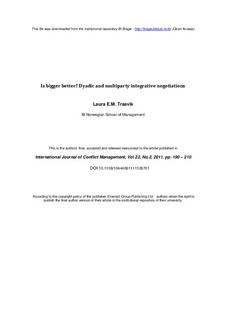Is bigger better? Dyadic and multiparty integrative negotiations
Journal article, Peer reviewed
Date
2011Metadata
Show full item recordCollections
- Scientific articles [2181]
Original version
http://dx.doi.org/10.1108/10444061111126701Abstract
Purpose – The purpose of the study is to empirically investigate the similarities and differences
between dyads and four-party groups in an integrative negotiation.
Design/methodology/approach – Data are collected in a between subjects experiment. A total of
182 participants completed a negotiation role play and questionnaire. Hypotheses are tested using
t-tests, MANOVAs and two multiple regression analyses.
Findings – Results demonstrate that dyads do outperform groups on both the economic and
subjective measures of outcomes. Sharing of priority information and the fixed pie bias was higher in
groups than in dyads. For dyads the procedure used (considering more than one issue at a time) led to
higher economic outcomes, and both procedure and problem solving were important for subjective
outcomes. For four-party negotiations, problem solving was significantly related to higher outcomes,
on both economic and subjective outcomes, and procedure was moderately related to economic
outcomes. Problem solving was significantly more important for the groups than for dyads on
economic outcomes.
Research limitations/implications – The controlled experimental setting could limit the
generalizabiltiy of the findings. Measures of the intermediate variables could be improved by
including additional items and observations. Future research is required in field settings using
multiple measures of the process.
Practical implications – In multiparty negotiation information sharing and the presence of
cognitive biases may not be as important as focusing on a problem solving approach.
Originality/value – An empirical investigation that groups under-perform dyads in an integrative
negotiation has not been conducted before.
Description
This is the authors’ final, accepted and refereed manuscript to the article. The publisher's version is available at www.emeraldinsight.com
